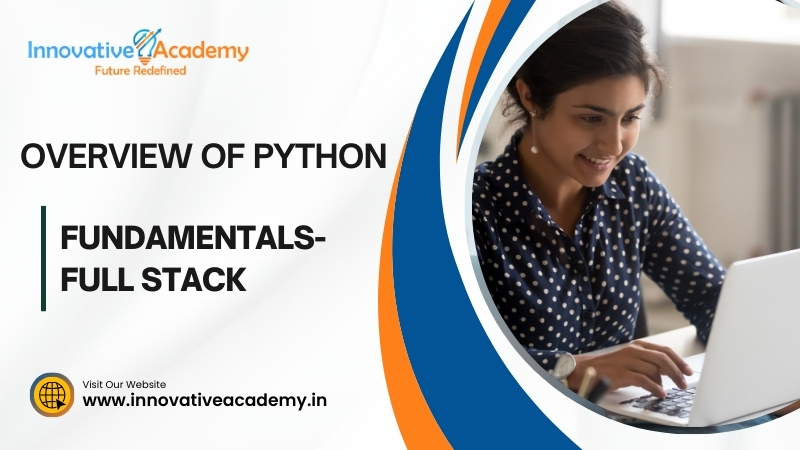OVERVIEW OF PYTHON
Table of Contents
Introduction
The language of Python is a flexible, famous, and modern programming language. It is used in web applications, data analysis, artificial intelligence technologies, and machine learning applications. It was first designed in 1991 by Guido van Rossum, a Dutch programmer, and the Python Software Foundation developed it later. It focuses on the readability of code and its simplicity. Therefore, it is an excellent language for learners and established developers and also a good choice for them. It is used in various applications like Google, Facebook, Instagram, Dropbox, and Uber.
Key Features
- Effortless :
Python’s syntax is designed to be simple and easy to read. Therefore, it ensures accessibility for both novice and seasoned developers. The language emphasizes making complex code simple and allowing engineers to focus on solving problems rather than intricacies. - Extensive Standard Library:
It has an all-inclusive built-in module with modules and packages for different types of activity, from handling files and web applications to data analysis and networking. This large library allows engineers to accomplish extra with minimum coding, speeding up the process. - Interpreted:
It means code is written line by line rather than assembled into machine code before running. This allows for quick testing and debugging, making it simple to experiment and repeat during further development. - Dynamic Typing:
A specific data type declaration isn’t required of a variable while defining it. The interpreter determines the types based on the value assigned. This feature of being flexible like the water of Python allows for faster coding and easier modifications to your code. - Static Typing or Strong Typing:
Even after being dynamically typed, this language enforces the data type of variables when code is run. This means that tasks involving incompatible types will raise an error, helping to prevent bugs and ensuring that the code works properly. - Cross-Platform:
The language can run on various operating systems, including Windows, MacOS, and Linux. This portable feature of Python makes it a good choice for developing applications that must work across different environments without any changes. - Flexible:
Python’s flexibility allows it to be used for many applications, from web development and API automation to artificial intelligence (AI), scientific development, and machine learning (ML). Its nature of being adaptable and its large ecosystem of libraries and frameworks make it suitable for almost any programming activity performed by engineers.
Courses of Python
- Python Fundamentals:
It forms the base of the language. It includes core topics such as syntax, data types, control structures, functions, and object-oriented programming (OOP). Understanding it is essential for anyone starting their journey with Python, as it helps them understand more difficult topics and applications. It is the first step of the ladder. - Advanced Python:
Advanced Python builds upon the basics, introducing more complex topics such as decorators, generators, context managers, and error handling. This stage also covers advanced data structures, including sets, tuples, and dictionaries, as well as working with external libraries and frameworks.
Applications of Python
- Website Development:
The strong frameworks of Python and its effortlessness make it an awesome choice for developing websites. These frameworks provide strong tools for building secure, scalable, and maintainable web applications. - Data Science and Machine Learning:
It is most chosen for data analytics and machine learning. Libraries like Pandas, NumPy, Scikit-learn, and TensorFlow enable data manipulation, statistical analysis, and the building of predictive models, making Python indispensable in this field. - Automation and Scripting:
Repetitive tasks are automated and scripts are written to manage system operations. Its ease of use and large range of libraries make it good for creating custom automation solutions, whether for managing files, processing data, or network monitoring. - Development of games:
It is also helpful during the development of games, mainly for prototyping and creating easy and simple games. Libraries like Pygame allow engineers to build games quickly. - AI (Artificial Intelligence):
It plays an important role in the advancement of AI. With strong libraries such as TensorFlow, Keras, and PyTorch, Python is used to develop AI models, including neural networks, natural language processing (NLP) systems, and computer vision applications.
Conclusion
Thus, the simple code, strong built-in modules, and flexibility of Python make it one of the most chosen programming languages. It offers the equipment and support to help you succeed in the starting stage of your career in programming and help you explore new domains as an experienced developer. As technology continues to move ahead with time, Python’s adaptability and wide ecosystem ensures that it remains a vital tool in the developer’s toolkit, driving innovation across various industries.
FAQ’S
1. What are the benefits of studying Python?
Go through the key features and applications of how is useful in many fields.
2. Where is Python used?
Go through the applications of Python.
3. Where can I pursue all the courses in Python?
Innovative Academy can help you pursue all levels of Python under the guidance of experienced faculties.
Contact for Course Details – 8447712333


No Comment